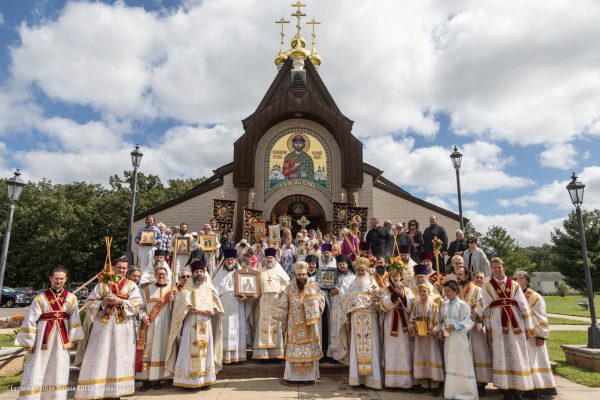The Holy Right-Believing Great Prince Alexander Nevsky was and remains for the Russian people an example of a model Christian, a brave warrior, and a wise commander. Churches and monasteries in Russia and around the world are named for him. In 1724, his relics were transferred to the Alexander Nevsky Lavra in St. Petersburg. The Church commemorated the transfer of the saint’s relics on August 30 (September 12 n.s.), a date when the life and glorious deeds of the right-believing prince are especially honored. On this day, St. Alexander Nevsky Diocesan Cathedral in Howell, NJ celebrates its patronal feast day.
This year, Eastern American Diocesan vicar Bishop Nicholas of Manhattan came to share in the joy of the feast with the clergy and parishioners of the cathedral.
On Friday, September 11, the clergy and faithful joyously greeted the wonderworking Kursk Root Icon of the Mother of God, under whose aegis the divine services were held. Bishop Nicholas then officiated the All-Night Vigil.
The day of the feast, September 12, began with the traditional blessing of water. Then, after the greeting of the bishop, Divine Liturgy began, celebrated by Bishop Nicholas.
The choir sang majestically under the direction of Alexandra Lukianov. Before Liturgy, Bishop Nicholas ordained parish Reader Roman Serebrennikov a subdeacon.
A large number of parishioners and guests came and prayed, and most of these received Christ’s Holy Mysteries.
Upon conclusion of Liturgy, His Grace greeted everyone with the feast and addressed the faithful with a sermon. Bishop Nicholas remembered those who served and labored for the good of the parish: Protopresbyter Valery Lukianov, Archpriests Boris Kizenko and Philip Petrovsky, Archdeacon Eugene Burbelo, and others, and noted that it is our responsibility to continue the good works that our ancestors did, also imitating in this the Holy Prince Alexander Nevsky.
“The Right-Believing Prince Alexander Nevsky had special qualities ? comeliness, discernment, prayer, nobility. A comely man is a man of God. But now the concepts of who and what are beautiful and comely are distorted. A comely person sees God’s creation in everything: both within and all around himself on the earth… Everything beautiful around us is from God. And we ourselves can be very beautiful within, and this is the most important thing in a person who lives spiritually and adorns his soul. In this way, St. Alexander Nevsky was also comely.
“We also need to be discerning: to reason calmly, to think with our mind, with our heart, and not rush when making vitally important decisions. This is what Prince Alexander Nevsky did. He did everything with reflection and prayer. From childhood, Alexander loved God, prayed, read the Holy Scriptures, and before each deed he asked God for help. We need to pray more, as well. Even saying ‘Lord, have mercy!’ means a great deal.
“Another important quality today is nobility. A noble person does a lot of good for his people, neighbors, family, and parish. He knows how to recognize his shortcomings and ask for forgiveness. Such a one was St. Alexander Nevsky.”
Bishop Nicholas called on the faithful to imitate the right-believing prince, asking for God’s help in acquiring comeliness, discernment, prayer, and nobility.
Then the clergy, faithful, and students of the parish school performed a procession around the cathedral, during which a litia was served at the grave of the builder and long-time rector of the cathedral, Protopresbyter Valery Lukianov.
Upon returning to the church, Bishop Nicholas awarded a diocesan gramotas to longtime cathedral sacristan Subdeacon Anthony Kofonow, and a Synodal gramota to Vitaly Konofolsky, who labored for the past 20 years in beautifying the territory of the cathedral and St. George and Our Lady of Tikhvin Churches.
Fr. Serge Lukianov thanked Bishop Nicholas for his shared prayers. On behalf of the clergy of the Patriarchal Parishes, Fr. Nicodemus (Balyasnikov) conveyed congratulations and well wishes from Bishop Matthew of Sourozh, and noted that, “thanks to the times we are experiencing, we have acquired much: the Church acquired a new and unique experience, and all of humanity was renewed through this crisis.
“The important thing is that we do not lose this expensively acquired experience, that we do not forget about our longing for the church, for joint divine services, for the Sacraments of Confession and Communion, and that each parish and church might offer us a new and unforgettable meeting with Christ and with each other.”
The cathedral sisterhood arranged a festal meal for everyone, during which the interaction between the clergy and parishioners continued.

















